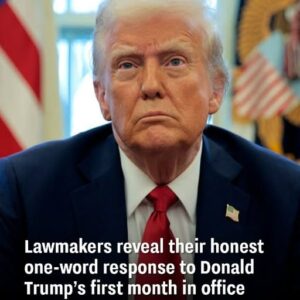Donald Trump has set his sights on psychiatric medication, introducing a controversial executive order that could significantly alter how healthcare professionals regulate prescription practices for children across the United States.
Earlier this week, the former president, 78, signed a White House policy launching the “Make America Healthy Again Commission,” a new initiative aimed at addressing the overall health of American children, particularly in the realm of mental health and illness.
A New Approach to Children’s Health
Chaired by Robert F. Kennedy Jr., the current U.S. Health and Human Services Secretary, the commission’s primary goal is to reduce chronic disease rates among children. The order explicitly calls for an investigation into the potential overuse of prescription medications, exposure to certain chemicals, and other environmental factors that may contribute to health issues in young people.
A significant aspect of the policy includes assessing the widespread use of psychiatric medications such as selective serotonin reuptake inhibitors (SSRIs), antipsychotics, mood stabilizers, stimulants, and weight-loss drugs. By 100 days after the order’s signing, the commission must submit an initial report detailing the prevalence of these prescriptions. Within 80 days after that, a strategy must be proposed, offering recommendations to the federal government on improving children’s health.
Concerns Among Healthcare Professionals
While the commission’s stated mission of improving child health appears well-intentioned, the suggestion that psychiatric medication poses a major threat to children has sparked widespread concern among medical experts.
Many physicians acknowledge that medications like SSRIs, stimulants, and antipsychotics have potential side effects, but they also stress that these treatments are often life-saving for children dealing with severe mental health conditions, including depression, anxiety, and ADHD. According to the report, there are currently 8.4 million cases of children affected by ADHD and ADD, conditions that could be directly impacted by any major changes in prescription regulations.
Dr. Lelach Rave, interim executive director of the Washington Chapter of the American Academy of Pediatrics, spoke out about the potential consequences of restricting access to mental health medication.
“Any parent who has a child struggling with depression, anxiety, or psychosis knows how terrifying that can be,” she told The Seattle Times. “There’s a lot of harm that comes with untreated illness.”
While she acknowledged the risks associated with psychiatric medications, she emphasized that the greater danger often lies in leaving mental health conditions untreated.
Potential Setbacks in Mental Health Treatment
The executive order has also raised concerns about the broader implications for mental health care. Summer Starr, interim director of Washington’s National Alliance on Mental Illness, warned that the policy could further stigmatize mental health treatment and create additional barriers for children in need.
“You’d never deny someone cancer treatment,” she pointed out. “There isn’t the same level of stigma for that. We’re trying to destigmatize mental health, and this just adds another layer of that.”
She further stressed that early intervention is crucial in mental health recovery, and delaying or restricting access to treatment could have long-term consequences.
A Divisive Policy
While many healthcare professionals agree that monitoring prescription practices is essential, they argue that a broad federal mandate could create tension between physicians and their patients. Rather than fostering responsible prescribing, experts fear the policy could lead to unnecessary delays in treatment, increased mental health crises, and fewer options for families in need.
As the commission begins its work, the debate over the role of psychiatric medication in children’s healthcare is set to intensify. Whether this new policy will lead to meaningful health improvements or create additional obstacles remains to be seen.




